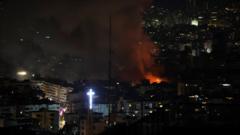In Gaza, the ongoing crisis has led to desperate food shortages, leaving parents like Nour Barda and Heba al-Arqan struggling to nourish their malnourished children. With Israeli aid blockades in effect and new distribution systems fraught with chaos, the situation appears increasingly dire.
Life on the Edge: Parents Struggle to Feed Their Children in Gaza Amid Ongoing Crisis

Life on the Edge: Parents Struggle to Feed Their Children in Gaza Amid Ongoing Crisis
As Israeli restrictions escalate, families in Gaza face dire hunger challenges, with limited supplies and a faltering aid distribution system.
As the humanitarian crisis in Gaza continues to deepen, parents are facing an unbearable struggle to nourish their children amid worsening conditions. Nour Barda and Heba al-Arqan are among many families affected, as they find themselves running out of resources, yearning for just a loaf of bread to feed their babies. Formerly hopeful of a brighter future when they conceived, the reality for Barda and al-Arqan has deteriorated further since the birth of their daughter Shadia this April.
Initially, the couple celebrated their pregnancy during a brief truce last November 2023, believing a semblance of stability would return to the region. However, by the time Shadia entered the world, the situation had turned dire, with mothers like al-Arqan unable to produce sufficient breast milk due to extreme food scarcity. Their son Jihad, born just weeks into the war, also faced malnutrition, a plight that has only intensified with time.
As of March 2025, a blockade imposed by Israel has severely restricted aid into Gaza, with nearly 80 days of near-total isolation. While the blockade was slightly alleviated in May, resulting in a minimal influx of supplies, it remains insufficient to meet the urgent needs of approximately two million residents.
Compounding the crisis, the traditional aid delivery mechanisms facilitated by the United Nations have faltered, with looting and fighting obstructing safe passage for delivery trucks. A disorganized new Israeli-backed aid distribution initiative has emerged, criticized for insufficient and chaotic assistance. Although proponents of the new program claim to have provided nearly nine million meals, the United Nations reports that it falls drastically short of what is required.
Security concerns at distribution sites, managed by private American contractors, have further complicated the situation. The presence of Israeli military forces surrounding these sites raises questions about the effectiveness of aid delivery amid rising tensions in the region. As families like Barda and al-Arqan come to terms with their harsh realities, the need for a comprehensive solution to the crisis in Gaza becomes increasingly urgent.





















